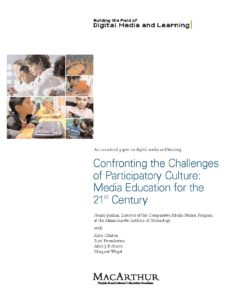Connected Learning
Equity & Access
Media Literacy
Confronting the Challenges of Participatory Culture: Media Education for the 21st Century
How can educators best understand the impact that Internet technologies are having on today’s youth and use that understanding to inform their teaching practices?

Download “Confronting the Challenges of Participatory Culture: Media Education for the 21st Century”
In his report Confronting the Challenges of Participatory Culture: Media Education for the 21st Century (PDF), funded by the John D. and Katherine T. MacArthur Foundation’s digital media and learning initiative, author Henry Jenkins identifies an Internet culture of participation that defines the lives of youth today.
Jenkins identifies the following skills as critical for literacy in a new media culture:
- Play—the capacity to experiment with one’s surroundings as a form of problem-solving
- Performance—the ability to adopt alternative identities for the purpose of improvisation and discovery
- Simulation—the ability to interpret and construct dynamic models of real-world processes
- Appropriation—the ability to meaningfully sample and remix media content
- Multitasking—the ability to scan one’s environment and shift focus as needed to salient details
- Distributed Cognition—the ability to interact meaningfully with tools that expand mental capacities
- Collective Intelligence—the ability to pool knowledge and compare notes with others toward a common goal
- Judgment—the ability to evaluate the reliability and credibility of different information sources
- Transmedia Navigation—the ability to follow the flow of stories and information across multiple modalities
- Networking—the ability to search for, synthesize, and disseminate information
- Negotiation—the ability to travel across diverse communities, discerning and respecting multiple perspectives, and grasping and following alternative norms.

